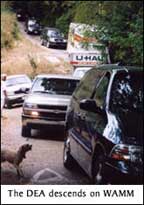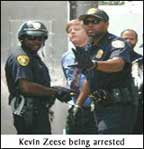or How the War on Drugs has Undermined our Domestic and International Security
All the talk recently about the 911 Commission, and who knew what/when, and what the priorities were, and on and on… It got my mind wandering about the relationship of the War on Drugs in all of this. It’s clear to me that the commission should be asking more questions.
I don’t know if 911 could have been prevented. Could the Bush/Clinton administration done something different? Sure. Would it have mattered? Who knows. However, I do know that the War on Drugs has been a major player —
This drug war has clearly
- Distracted federal effort, focus, and resources from more important issues like terrorism
- Actually provided funding for terrorism, through prohibition profits and corruption
- Created conditions of instability that encourage terrorist growth
The War on Drugs and Afghanistan
Robert Scheer wrote Tuesday in the Los Angeles Times:
But what is perhaps even more astonishing is that, because the Bush administration’s attention was focused on the “war on drugs,” it praised Afghanistan’s Taliban regime even though it was harboring Bin Laden and his terror camps. The Taliban refused to extradite the avowed terrorist even after he admitted responsibility for a series of deadly assaults against American diplomatic and military sites in Africa and the Middle East.æOn May 15, 2001, I blasted the Bush administration for rewarding the Taliban for “controlling” the opium crop with $43 million in U.S. aid to Afghanistan, to be distributed by an arm of the United Nations. Secretary of State Colin L. Powell announced the gift, specifically mentioning the opium suppression as the rationale and assuring that the U.S. would “continue to look for ways to provide more assistance to the Afghans.”
What Scheer leaves out is the fact that while we were subsidizing the Taliban as a reward for suppressing poppy growers, the Taliban appeared to be using the ban to increase the value of their stockpiles.
The UN suspects Afghanistan’s fundamentalist rulers of selling their vast opium stockpiles to pay for the war effort against rebel leader Ahmed Shah Masood.æ The order to destroy the poppies — a vain attempt to gain international recognition — was announced last July by Taliban leader Mohammad Omar.æ He declared opium-growing un-Islamic, and the ban was ruthlessly enforced…. The UN Drug Control Program says the ban has created a shortage of heroin, driving up prices locally from the equivalent of $55 a kilo to about $500.
The prices stayed high until the Taliban lifted the ban shortly after 9/11/01:
In a dramatic and little-noticed reversal of policy, the Taliban have told farmers in Afghanistan that they are free to start planting poppy seeds again if the Americans decide to launch a military attack….Last night one Afghan trader, who had just fled from Afghanistan, said the price of opium per kilo had now fallen from 50,000 Pakistani rupees (£525) to 10,000 rupees (£105). Everybody was trying to offload existing stocks, he said.
“Almost all Afghans will be cultivating poppy as it was their only cash crop. They can’t cultivate other crops as the soil is fit only for poppy cultivation,” he claimed.

Now, of course, after the liberation of Afghanistan, came the headache of re-building, once again directly tied to the poppy, as this outstanding New York Times article – Afghan Route to Prosperity: Grow Poppies – points out:
But as opium production underpins ever more of Afghanistan’s economic life, from new business growth to home construction, officials also fear that the economic and political risks of uprooting it will only increase. To the chagrin of Afghan and international officials, the narcotics industry has far outpaced the legal reconstruction of Afghanistan, with a capitalist intensity they would otherwise applaud.It has lured private capital for investment and created a free-market system. With Thuraya satellite phones, farmers in distant Kandahar, a rival source of poppy in the south, know almost in real time about changing weather conditions here in this northeastern province, Badakshan, and adjust prices accordingly.
Landowners and traffickers offer credit to farmers willing to grow poppy. Trafficking has linked Afghanistan to the global economy. It even brought the first real industry here, a heroin processing laboratory that villagers estimated had operated for six months to a year before it was destroyed by Afghan and British forces in January. One local referred to it as “the company.”
So here we are trying to re-build the country, and we spend our time destroying the only industry that has a chance of assisting with that rebuilding.
Our own officials could do to read the Times article, because it appears (as I reported last week) they do not understand the dynamics:
Robert Charles, the assistant secretary of state for international narcotics and law enforcement, said Britain was being too squeamish about eradicating poppy fields before Afghan farmers had found an alternative source of crops and income.“Our point of disagreement, and I put it very directly,” said Mr Charles, “is that we believe that if there is a heroin poppy that needs to be eradicated, we shouldn’t be picking and choosing, we shouldn’t be delaying, waiting for an alternative revenue stream to become available.”
He said: “Our priority should not be some kind of misplaced sympathy for someone who will have to do a little bit more work [to grow other, less-lucrative crops, such as wheat or barley].”
We could, of course, support a legal poppy industry in Afghanistan. This would help rebuild the country and increase stability in the region while cutting offf funding and recruitment to terrorists. Or, we would attempt to destroy the poppy industry, cause poverty and instability giving rise to terrorism, while the poppy crops grow anyway controlled by criminal enterprise and providing funding to terrorists.
Of course, in the idiocy of our drug war blindness, the choice is simple. Support terrorism.
The War on Drugs and Terrorism at Home
Let’s take a look a little closer to home. Was the War on Drugs affecting our preparedness here? Yep.
As I mentioned last month, Newsweek’s Investigative Correspondent Michael Isikoff and Assistant Managing Editor Evan Thomas, noted that in the first few months of the administration:
Attorney General John Ashcroft downgraded terrorism as a priority, choosing to place more emphasis on drug trafficking and gun violence…
This June, 2002 colunmn in Alternet noted:
While Osama bin Laden and his al-Qaida minions were diligently preparing for their murderous mission, the FBI was looking the other way with equal determination. More than twice as many FBI agents were assigned to fighting drugs (2,500) than fighting terrorism (1,151). And a far greater amount of the FBI’s financial resources was dedicated to the war on drugs….In Phoenix, where the now infamous Ken Williams memo originated, counterterrorism agents complained bitterly about their efforts being given “the lowest investigative priority” by a supervisor who preferred glamorous drug-fighting investigations.
Clearly, by focusing resources on the war on drugs, we dropped the ball on preparedness for 9/11. After 9/11, however, we corrected that problem, right? Wrong.
The federal government already had this nice little war going on in California.
Federal agents had been harassing other pot clubs before September 11, but the attacks forced them to suspend their campaign — for two weeks.æ On September 28, DEA agents took thousands of records from a medical research center in El Dorado County.
Then, on October 25, they hit the Los Angeles Cannabis Resource Co-op, a hotbed of… sick people:
Around 5 P.M., an officer from the Drug Enforcement Administration rang the bell at the co-op.æ Behind him stood 29 other agents, most armed with pistols.æ Their unmarked sedans clogged the street.æ Anyone passing by the nondescript building on Santa Monica Boulevard might have assumed a drug kingpin lived inside.
 Then, one year after 9/11, the feds breached the enemy stronghold of the Wo/Men’s Alliance for Medical Marijuana garden:
Then, one year after 9/11, the feds breached the enemy stronghold of the Wo/Men’s Alliance for Medical Marijuana garden:
Suzanne Pfeil, an alliance member staying at the Corral’s, said she was awakened by two-dozen camouflage-clad agents in helmets who pointed automatic weapons at her.“They told me to stand up,” said Pfeil, who suffers from post-polio syndrome and uses a wheelchair.æ “I told them I’m sorry.æ I can’t stand up.”
In 2002, the Seattle Times reported:
Although nine states have approved the use of medical marijuana, Ashcroft has concentrated the weight of the anti-drug bureaucracy on California.æ His agents have busted marijuana clubs in West Hollywood, Oakland, San Francisco, Sebastapol and, most recently, Santa Cruz.æ California Attorney General Bill Lockyer characterized the raids as “punitive expeditions.”Some of you might think that federal law enforcement would have its hands full chasing down terrorists bent on mass destruction.æ Stoned Californians can wait for another day.æ Well, Ashcroft says he’s on to both.æ He is perfectly capable of flicking on the orange terrorism alert then sending federal agents to weed out marijuana plants in hostile California territory.

and San Francisco’s district attorney said:
I hope the DEA, the Justice Department and the entire Bush administration will heed the “Cease and Desist” orders delivered by yesterday’s protesters.æ Surely at a time when we face so many real threats — like the senders of anthrax-laced letters who still have not been caught — the federal government has better things to do than to deprive sick people of their medicine.
During this time, the administration found other ways to go after terrorists. Well, that is assuming that terrorists toke up and watch the Superbowl:
“Where do terrorists get their money?” asks one of the ads, which portrays a terrorist buying explosives, weapons and fake passports. “If you buy drugs, some of it might come from you.
Yep, to avoid their own complicity in funding terrorism through drug prohibition profits, the feds tried to blame pot smokers.
And while, to this date, Osama bin Laden has not been found, John Ashcroft can be proud of the fact that, at a cost of a mere $12 million, they were able to capture noted bong entrepreneur Tommy Chong.
I feel so much safer.

